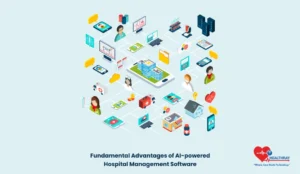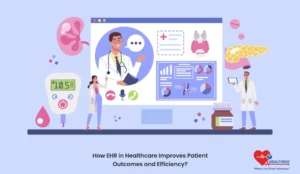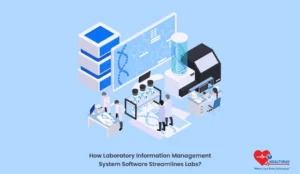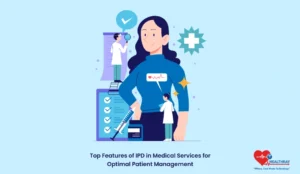Artificial Intelligence is no longer a futuristic concept—it’s reshaping how hospitals operate and how patients experience care. From diagnosing illnesses with incredible precision to optimizing the smallest administrative tasks, AI-driven Hospital Information Management System are changing the healthcare landscape.
For the administrator, it means streamlined workflows and cost savings. For the tech-savvy doctor, AI enhances diagnostic accuracy and improves patient outcomes. And for the policymaker, it may be a key to closing gaps in healthcare access and equity.
The following post deep-dives into how AI-powered HMS is revolutionizing healthcare. You’ll learn how it improves care, enhances efficiency, and meets the needs of modern healthcare systems. Whether you’re a healthcare leader or a practitioner looking for smarter solutions, this is your roadmap to understanding AI’s transformative impact.
The Role of AI in Enhancing Patient Care
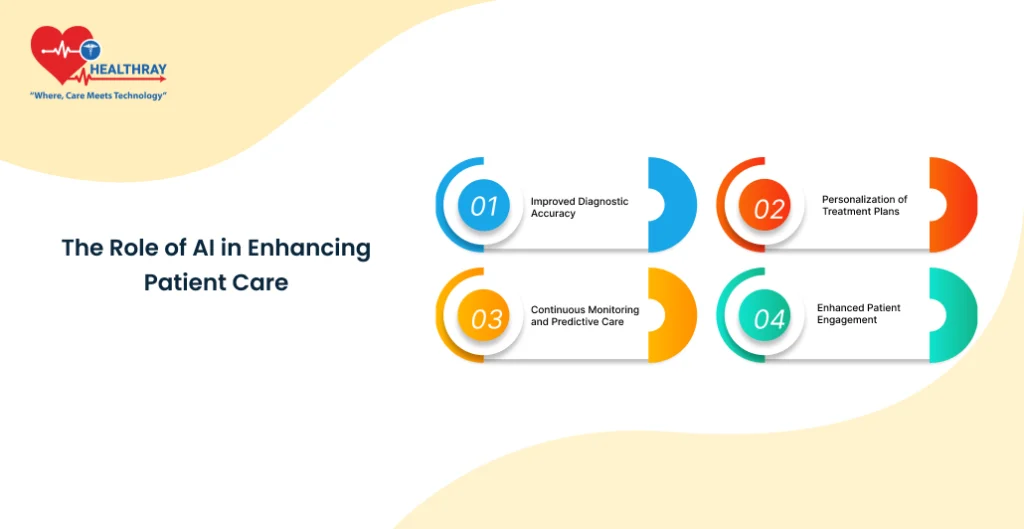
AI redefines patient care and is making it quicker, precise, and very personalized. It bridges the gaps that other traditional means cannot fulfill and see to it that patients get the best treatment at the right time.
Improved Diagnostic Accuracy
AI-powered tools analyze patient data, such as medical records and imaging scans, with unparalleled precision. These tools can identify patterns and anomalies that may go unnoticed by human eyes, resulting in earlier and more accurate diagnoses. For example, AI algorithms are being used to detect conditions like cancer and cardiovascular diseases with success rates rivaling top specialists.
Personalization of Treatment Plans
Every patient is different, and their treatment should be tailored to their individual needs. AI takes into consideration data from genetics, lifestyle, and previous health records to create customized treatment plans. Such precision ensures that patients receive therapies that work best for them, thus improving outcomes and reducing trial-and-error approaches.
Continuous Monitoring and Predictive Care
Wearable devices and IoT-enabled tools powered by AI provide real-time health tracking. These devices monitor vital signs, detect irregularities, and alert caregivers before a condition escalates. This proactive approach can save lives, especially for patients with chronic conditions like diabetes or hypertension.
Enhanced Patient Engagement
AI-driven chatbots and virtual assistants are transforming how patients interact with healthcare providers. From answering queries to scheduling appointments, these tools make healthcare more accessible and reduce the administrative burden on medical staff.
The Bigger Picture
But AI doesn’t stop there: it is enhancing individual care and helping build smarter, data-driven ecosystems in which patients, providers, and systems work in harmony. It enables opportunities for proactive interventions, thus reducing hospital readmissions and improving overall patient satisfaction.
Boosting Operational Efficiency with AI
Running a hospital efficiently is as important as providing excellent medical care. AI-powered solutions in Hospital Management Systems (HMS) are transforming the way hospitals operate by reducing inefficiencies, saving time, and cutting costs. Here’s how:
Streamlining Administrative Tasks
AI simplifies time-consuming administrative duties like patient admissions, discharge processes, and medical billing. Automated systems ensure accuracy, reduce paperwork, and free staff to focus on patient care, which is extremely useful for hospitals dealing with a large volume of patients.
Optimizing Resource Allocation
AI helps administrators make data-driven decisions on resource management. It can predict peak times in emergency rooms, schedule staff accordingly, and ensure that critical supplies like medications and equipment are always available. This reduces waste and ensures resources are used where they are most needed.
Scheduling and Workflow Management
AI-powered scheduling systems analyze the pattern for optimum shifts, minimizing staff burnout and enhancing efficiency. For instance, predictive algorithms can forecast the inflow of patients and make sure that the personnel and facilities needed are available at the right time.
Minimizing Errors
Errors in healthcare operations can have serious consequences. AI algorithms help minimize these risks by ensuring data consistency, automating repetitive tasks, and cross-referencing patient information for accuracy.
Reducing Provider Burnout
AI handles the mundane and repetitive tasks, freeing healthcare providers to do what they were educated and trained for: diagnose and treat patients. This not only improves job satisfaction but also enhances the quality of care patients receive.
The Long-Term Benefits
Hospitals adopting AI for operational tasks see measurable improvements in efficiency, patient satisfaction, and cost savings. This smarter approach helps hospitals provide better care with fewer resources, which is critical in today’s healthcare environment.
Implementing AI-Driven Hospital Management Systems
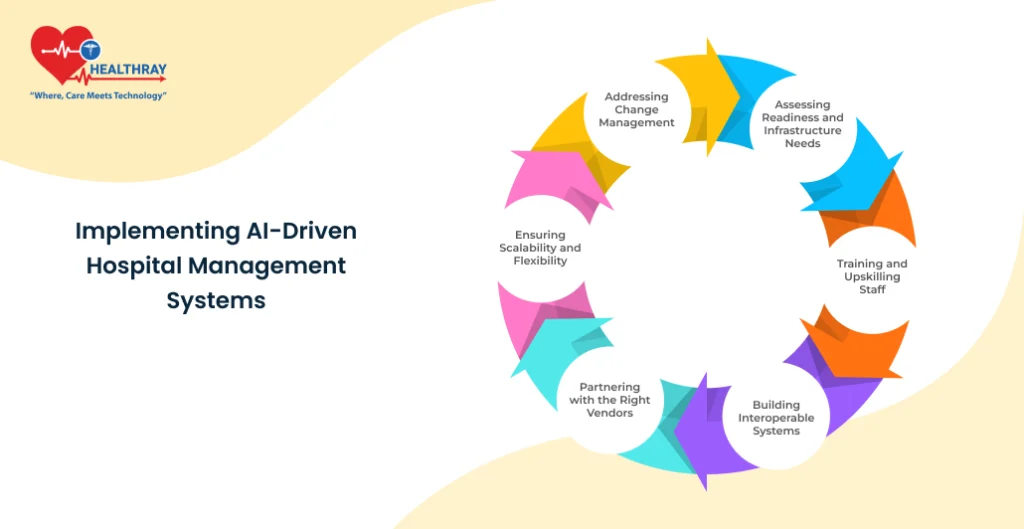
Introducing AI into hospital operations requires careful planning, strategic investments, and a commitment to innovation. While the potential is immense, successful implementation depends on a few key steps.
Assessing Readiness and Infrastructure Needs
Before adopting an AI in Hospital Management Systems, hospitals must evaluate their current systems and readiness. This involves analyzing existing infrastructure, identifying gaps, and determining what upgrades are necessary to support AI technologies. Secure and scalable data systems are essential for seamless integration.
Training and Upskilling Staff
The effectiveness of AI tools is as good as the people using them. Hospital staff, from administrators to doctors, require training to understand and use these technologies. Upskilling programs would help employees transition smoothly into the new workflows, allowing them to feel confident and supported.
Building Interoperable Systems
AI-driven systems must integrate seamlessly with existing hospital technologies, such as electronic health records (EHRs) and lab management systems. Interoperability ensures that data flows smoothly across platforms, enabling better decision-making and collaboration.
Partnering with the Right Vendors
Selection of the right AI solutions is critical. The hospitals must work with vendors who understand the specific challenges in healthcare and offer tailored solutions. It can be an opportunity for collaboration with tech companies and AI startups.
Ensuring Scalability and Flexibility
AI technologies should grow with the hospital’s needs. Scalable systems allow hospitals to expand their capabilities over time, whether it’s adding more advanced predictive tools or incorporating new functionalities.
Addressing Change Management
Staff accustomed to traditional methods will resist the transition to AI-powered systems. This can be eased by clear communication of benefits and involving teams in the decision-making process to encourage a culture of innovation.
The Path to Smarter Healthcare
Implementing AI-driven HMS isn’t just about adopting technology—it’s about reshaping how hospitals function. By focusing on readiness, training, and seamless integration, healthcare institutions can unlock the full potential of AI and deliver smarter, more efficient care.
Policy, Ethical, and Regulatory Considerations
As AI becomes more embedded in healthcare, hospitals and policymakers must address key ethical and regulatory challenges. While the technology offers exciting possibilities, it also raises concerns about privacy, bias, and compliance with healthcare standards.
Data Privacy and Security
AI systems rely on large volumes of sensitive patient data. Protecting this data is non-negotiable. Hospitals must ensure that their AI solutions comply with privacy laws such as HIPAA and GDPR. Encryption, anonymization, and robust cybersecurity measures are essential to prevent breaches.
Ethical Concerns and Bias
AI algorithms can be only as fair-minded as the data they’re learning from. Inaccurate or data sets that reinforce present imbalances can result in skewed outcome or outcomes in healthcare settings. It is critical to monitor the decisions being made by these systems, focusing on addressing disparities in representation of data.
Transparency in AI Decision-Making
AI systems often function as “black boxes,” making decisions without clear explanations. For healthcare providers and patients, understanding the reasoning behind an AI recommendation is critical. Hospitals should prioritize transparency in AI tools to build trust and ensure accountability.
Regulatory Compliance
Healthcare is a highly regulated sector, and AI-driven tools have to be very strict about standards. Hospitals should be working with vendors who meet the certification requirements and follow guidelines set by organizations like the FDA or equivalent regulatory bodies in their region.
Liability and Accountability
Who is liable when AI makes a mistake? Defining liability in cases of misdiagnosis or system failure is complex but necessary. Hospitals should have clear protocols in place to address potential risks and ensure that patients and providers are protected.
Navigating International Standards
For hospitals operating across borders, aligning AI-driven HMS with varying international regulations can be a challenge. Ensuring compliance with diverse frameworks requires collaboration between policymakers and healthcare leaders.
The Need for Ongoing Oversight
Ethical and regulatory considerations aren’t one-time tasks—they require continuous evaluation and adaptation. As AI evolves, so will the policies and standards governing its use. Hospitals that stay proactive in addressing these issues will be better positioned to leverage AI’s potential while safeguarding patients’ rights.
Case Studies and Success Stories
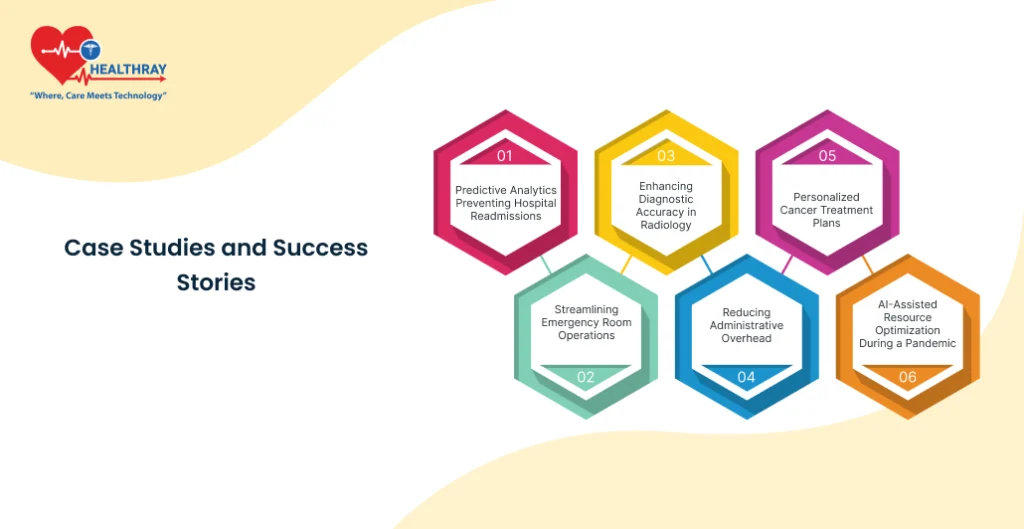
Adopting AI-driven Hospital Management Systems (HMS) has already produced impressive results in healthcare institutions around the world. These success stories demonstrate the transformative power of AI in patient care and operational efficiency.
Predictive Analytics Preventing Hospital Readmissions
A large urban hospital implemented an AI-based predictive analytics tool to identify patients at high risk of readmission. By analyzing patient history, lab results, and treatment patterns, the system flagged cases requiring additional care. The hospital reduced its readmission rates by 20%, improving patient outcomes and saving significant costs.
Streamlining Emergency Room Operations
A mid-sized healthcare facility was the first to introduce AI triage in its emergency room. The AI triage determined the urgency of each case and, thus reduced wait times by 35%. It therefore improved patient satisfaction but made it possible for health practitioners to deal with cases appropriately.
Enhancing Diagnostic Accuracy in Radiology
A hospital network partnered with an AI vendor to integrate imaging analysis tools into its radiology department. These tools significantly reduced diagnostic errors in conditions like lung cancer and fractures, achieving accuracy rates of over 95%. Radiologists reported that the tools acted as valuable second opinions, improving both speed and confidence in diagnoses.
Reducing Administrative Overhead
An academic hospital deployed AI-driven automation for billing and claims processing. This eliminated redundant tasks and minimized human errors, resulting in quicker reimbursements and a 40% reduction in administrative costs. Staff could redirect their focus toward patient-centric activities.
Personalized Cancer Treatment Plans
A cancer research center used AI to analyze genetic and clinical data, enabling personalized treatment recommendations for patients. The approach improved survival rates and reduced treatment side effects. Patients received therapies tailored to their unique genetic profiles, showcasing AI’s potential for precision medicine.
AI-Assisted Resource Optimization During a Pandemic
During the COVID-19 pandemic, a hospital system used AI to optimize ventilator usage and bed allocation. The system predicted demand surges and suggested resource adjustments. That way, the hospital was able to manage its capacity efficiently during critical times.
Takeaways for Future Implementations
These real-world examples highlight how AI-driven HMS can address diverse healthcare challenges. They demonstrate measurable benefits like cost savings, better patient outcomes, and improved operational efficiency. Hospitals looking to adopt AI can draw valuable lessons from these success stories to guide their own implementations.
Conclusion
The integration of AI into Hospital Management System is more than a trend—it’s a transformative shift that’s redefining patient care and hospital management. AI-driven Hospital Management Systems are proving to be invaluable tools for improving diagnostic accuracy, personalizing treatments, and streamlining operations. Hospitals that embrace these technologies today are setting the foundation for smarter, more efficient healthcare systems tomorrow.
However, successful adoption requires careful planning. From ensuring data security to addressing ethical concerns, every step must be taken thoughtfully. As the case studies show, hospitals that invest in AI reap tangible benefits, not just for their operations but for the patients they serve.
For hospital administrators, tech-savvy doctors, and policymakers, the message is clear: AI isn’t just an option; it’s the future of healthcare. The time to explore its potential is now.


